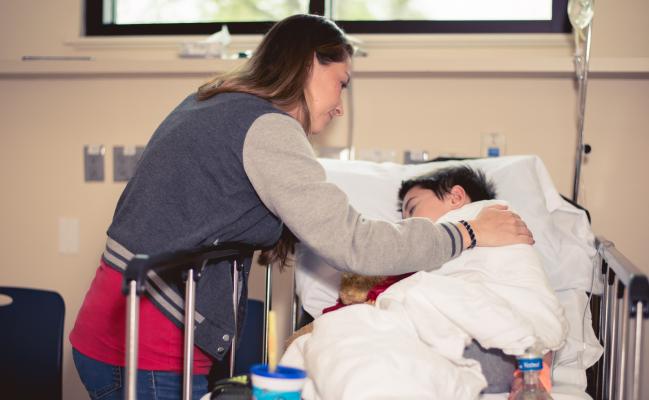Preparing Your Family for Your Child's Surgery

Type: Caregiver Advice
Date: July 8th 2015
When it comes to your child, even a simple, outpatient procedure can be intimidating. And chances are, it’s stressful for the whole family. Here are a few tips for alleviating the anxieties and fears you and your family might be feeling.
Pediatric surgery affects the entire family
When it comes to your child, even a simple, outpatient procedure can be intimidating. And chances are, it’s stressful for the whole family. Here are a few tips for alleviating the anxieties and fears you and your family might be feeling.
Talk about it.
Talking about your fears, getting them out in the open, and finding answers to your questions can all help reduce stress and anxiety. If your child is old enough, have an honest but positive conversation of what to expect on the day of the procedure and afterward. Explain the benefits of the procedure for their health and well-being. Reassure them you’ll be nearby the whole time. Let him ask questions and answer them as best you can. If you don’t know the answer, write it down and call your surgeon’s office. You and your child will feel better when you know what to expect.
If your child is young or you worry a conversation about his surgery may frighten or overwhelm him, you can get him used to the idea of surgery by reading a few age-appropriate books that positively portray hospitals or surgery. A few of our favorites are Franklin Goes to the Hospital, A Visit to the Sesame Street Hospital, and Curious George Goes to the Hospital.
Recognize sibling stress.
Whether they’re normally rivals or two peas in a pod, siblings tend to worry when one is sick or nervous. Take time to talk to older siblings about what will happen on the day of the surgery. Give them a positive impression, answer their questions, and reassure them. You may even want to recruit them as helpers so they feel like they’re helping their little brother or sister on the big day.
Be prepared.
Nothing can add stress to the day of your child’s procedure quite like the last-minute hustle to find his favorite toy or to prepare extra bottles for the diaper bag. Save yourself from this situation by making a detailed list of everything you’ll need to bring. This should include a comfort item for your child, snacks for you (especially if you’ve chosen to fast with your child), and games or books for the siblings if they will be waiting with you.
The staff at your surgical center is there for you and your child. Ask lots of questions leading up to the day of the procedure so you feel confident. The calmer you are, the calmer your child will be, too.
If possible, make sure paperwork is handled ahead of time. This way you can focus on comforting and reassuring your child while you wait, rather than filling out forms.
Take care of yourself.
Even though your child is the one having a procedure, chances are you’re experiencing even more stress and anxiety than he is! It’s okay and completely normal for you to worry about your child. But remember, your child will sense your mood and respond to any stress or worry you feel. Help yourself stay calm by talking to the doctors and staff to make sure all your questions are answered. You may also want to share your fears with a friend or loved one; it helps just to talk. Lastly, make sure you get plenty of rest the night before the surgery so you’re ready to be supportive and extra-patient that morning.
Have a plan for post-op.
After surgery, your child will need to recover. An outpatient procedure means your child will come home with you the same day as the procedure. You can help everyone feel calm and prepared by designating a place for your child to rest at home where he is comfortable. This may his own room, or yours, or perhaps even in the den in front of the television. Set expectations with siblings that your child is to rest, which means the house should be quiet. And yes, he gets to pick which movies you watch.
You can also prepare for post-op by carefully reading the surgical center’s post-op instructions and making sure to ask any questions ahead of time. If your child will need prescriptions filled, designate who in the family will be heading to the pharmacist and who will stay home with the child. Finally, remember that your child may experience some pain and may even cry once they are home. Stay calm, keep him comfortable and relaxed, and if you start to worry, call your pediatrician.

